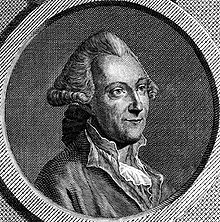- Christian Adolph Klotz
-
Christian Adolph Klotz (13 November 1738 – 31 December 1771) was a German philologist. He was a renowned representative of the transition period between the Age of Enlightenment and Sturm und Drang.[1]
Contents
Education
Klotz, son of a senior church official, was born in Bischofswerda, Lusatia. He attended the gymnasium in Meißen and Görlitz. From 1758 till 1760 he studied at the University of Leipzig. Already in these years he published first philological works. Then he moved to the University of Jena, where he wrote polemic papers against Pieter Burman the Younger. Klotz defended his dissertation and habilitation in Jena and held lectures about Horace.
Work
In 1762 he obtained the position of an associate professor and in 1763 that of a full professor from the University of Göttingen. In 1765 Klotz moved to Halle, where he served as Professor für Philosophie und Beredsamkeit (Professor of Philosophy and Eloquence). There he became very popular for his literary creations and exerted a significant influence on the contemporary taste and thinking. Johann Georg Jacobi was among his supporters. Klotz published various literary journals, among them Acta Litteraria, and introduced his students to Italian poetry as of Torquato Tasso.
In 1766 Klotz was appointed court council by the king, after he had refused a call to Warsaw. In 1769 he supported Karl Friedrich Bahrdt, who came like Klotz from Bischofswerda, to obtain the chair of biblical antiquities in the philosophical faculty at Erfurt, two years after scandals in Bahrdt's private life had led to his dismissal.
Klotz' strength were his ability to cover a wide range of topics and his aesthetic as well as enjoyable style, both in Latin and German language. As his weakness, however, critics identified sometimes the depth and originality of his thinking. Johann Gottfried Herder and Gotthold Ephraim Lessing became known as the most influential opponents. Klotz died in Halle in 1771.
References
- ^ Achim Aurnhammer: Torquato Tasso in Deutschland, Walter de Gruyter, 1995
- Conrad Bursian (1882) (in German). "Klotz, Christian Adolph". In Allgemeine Deutsche Biographie (ADB). 16. Leipzig: Duncker & Humblot. pp. 228–231.
- Article in Meyers Online
Literature
- Christian Adolph Klotz in the German National Library catalogue (German)
- Ueber das Studium des Alterthums, 1766
- Lessing's und Klotz's Briefe vornehmlich den Laokoon betreffend mit Heyne's Grundriss einer Anweisung zur Kenntniss der alten Kunstwerke: Nebst denkwürdigen Thatsachen im geschichtlichen Zusammenhange für die Literatur-Welt, Wissenschaft, Kunst, und Buchhandel, Ed.: Johann Heinrich Martin Ernesti, 1834
Categories:- 1738 births
- 1771 deaths
- People from Bischofswerda
- People from the Electorate of Saxony
- German philologists
- University of Leipzig alumni
- University of Jena alumni
- University of Göttingen faculty
- University of Halle faculty
- 18th-century German people
Wikimedia Foundation. 2010.

